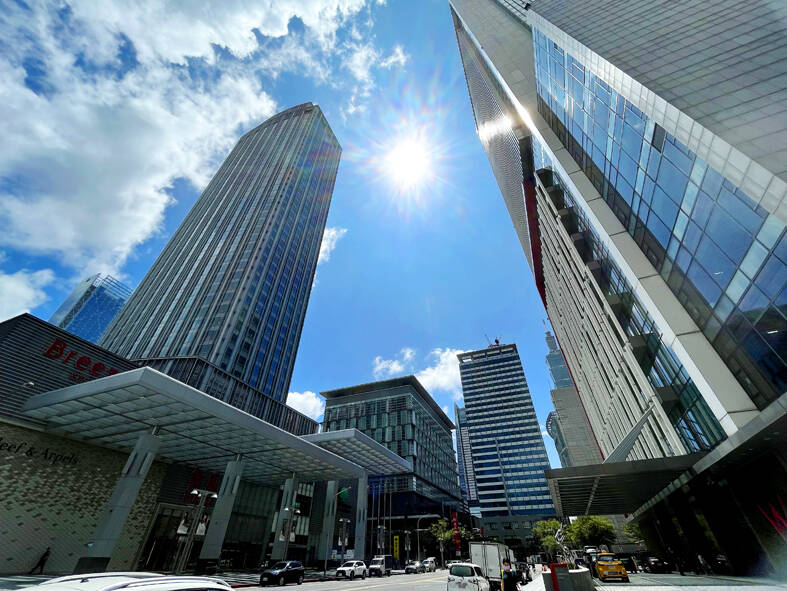The vacancy rate for Grade-A offices in Taipei last quarter rose 0.5 percentage points, while rents climbed to a record NT$3,279 per ping (3.3m2), as demand remained healthy, property consultancy REPro Knight Frank (瑞普萊坊) said on Tuesday.
Despite the uptick, the 6.4 percent vacancy rate during the April-to-June period is lower than the 20-year average and Taipei ranked the fourth-best performer in the Asia-Pacific region, after Seoul’s 1.5 percent, Tokyo’s 4.3 percent and Singapore’s 5 percent, the international broker said.
The uptrend in office rents is due to inflation and the growing importance corporations assign to modern office spaces that can help boost work efficiency and meet environmental friendliness and energy conservation requirements, it said.

Photo: Hsu Yi-ping, Taipei Times
A total of 55,000 ping of new office spaces would join the market in central business districts later this year, aided by the government’s efforts to facilitate urban renewal projects and retire old and dilapidated buildings, it said.
Developers have responded, taking advantage of favorable building terms and related business opportunities, it said.
Hospitality service providers lent support by shutting down old facilities during the COVID-19 pandemic and converting them into mixed-use complexes featuring residential and commercial spaces.
New high-end office buildings are near the Taipei Dome in the prime Xinyi District (信義), near Taipei Railway Station in Zhongzheng District (中正), across from the Howard Plaza Hotel Taipei (台北福華飯店) in Daan District (大安) and in Zhongshan District (中山).
Their entry would ease a supply crunch over the past few years that set off a relocation wave, REPro Knight Frank said.
Corporations have shown a preference for divisions to work in the same building as their headquarters to bolster communication and coordination, it said.
REPro Knight Frank said it is not worried about a supply glut as some buildings are intended for self-occupancy, such as a new complex owned by Yuanta Commercial Bank (元大銀行) near the Howard Hotel.
Furthermore, urban renewal projects account for several new office buildings, meaning the net gain in new offices is limited, it said.
In addition, the limited availability of land in Taipei and the lengthy complicated efforts for urban renewal projects would limit the entry of new office buildings and make the ones available attractive, it said.

SEMICONDUCTORS: The German laser and plasma generator company will expand its local services as its specialized offerings support Taiwan’s semiconductor industries Trumpf SE + Co KG, a global leader in supplying laser technology and plasma generators used in chip production, is expanding its investments in Taiwan in an effort to deeply integrate into the global semiconductor supply chain in the pursuit of growth. The company, headquartered in Ditzingen, Germany, has invested significantly in a newly inaugurated regional technical center for plasma generators in Taoyuan, its latest expansion in Taiwan after being engaged in various industries for more than 25 years. The center, the first of its kind Trumpf built outside Germany, aims to serve customers from Taiwan, Japan, Southeast Asia and South Korea,

Gasoline and diesel prices at domestic fuel stations are to fall NT$0.2 per liter this week, down for a second consecutive week, CPC Corp, Taiwan (台灣中油) and Formosa Petrochemical Corp (台塑石化) announced yesterday. Effective today, gasoline prices at CPC and Formosa stations are to drop to NT$26.4, NT$27.9 and NT$29.9 per liter for 92, 95 and 98-octane unleaded gasoline respectively, the companies said in separate statements. The price of premium diesel is to fall to NT$24.8 per liter at CPC stations and NT$24.6 at Formosa pumps, they said. The price adjustments came even as international crude oil prices rose last week, as traders

Taiwan Semiconductor Manufacturing Co (TSMC, 台積電), which supplies advanced chips to Nvidia Corp and Apple Inc, yesterday reported NT$1.046 trillion (US$33.1 billion) in revenue for last quarter, driven by constantly strong demand for artificial intelligence (AI) chips, falling in the upper end of its forecast. Based on TSMC’s financial guidance, revenue would expand about 22 percent sequentially to the range from US$32.2 billion to US$33.4 billion during the final quarter of 2024, it told investors in October last year. Last year in total, revenue jumped 31.61 percent to NT$3.81 trillion, compared with NT$2.89 trillion generated in the year before, according to

PRECEDENTED TIMES: In news that surely does not shock, AI and tech exports drove a banner for exports last year as Taiwan’s economic growth experienced a flood tide Taiwan’s exports delivered a blockbuster finish to last year with last month’s shipments rising at the second-highest pace on record as demand for artificial intelligence (AI) hardware and advanced computing remained strong, the Ministry of Finance said yesterday. Exports surged 43.4 percent from a year earlier to US$62.48 billion last month, extending growth to 26 consecutive months. Imports climbed 14.9 percent to US$43.04 billion, the second-highest monthly level historically, resulting in a trade surplus of US$19.43 billion — more than double that of the year before. Department of Statistics Director-General Beatrice Tsai (蔡美娜) described the performance as “surprisingly outstanding,” forecasting export growth